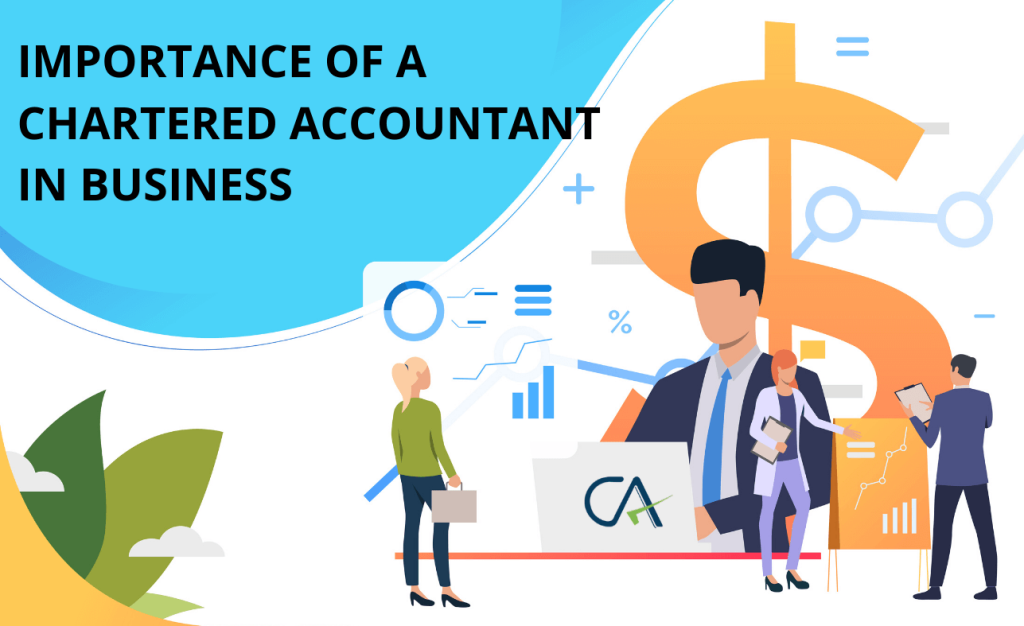Introduction
In today’s competitive business environment, small businesses face numerous challenges ranging from financial management to regulatory compliance. While many entrepreneurs excel at delivering products or services, the financial and compliance aspects of running a business often require specialized expertise. This is where a Chartered Accountant (CA) becomes an invaluable asset. Beyond just balancing books and filing tax returns, a CA can be a strategic partner in your business journey, helping you navigate complex financial landscapes and make informed decisions. This blog explores why having a CA is not just beneficial but essential for small businesses looking to thrive in today’s economy.
The Role of a CA in Business Decision-Making
Strategic Financial Planning
Chartered Accountants do much more than maintain records and prepare financial statements. They play a pivotal role in strategic financial planning, helping business owners understand their financial position and make informed decisions. A competent CA analyzes your business’s financial health, identifies strengths and weaknesses, and recommends strategies to improve profitability and sustainability.
For instance, when planning expansion, a CA can create detailed financial projections, assess funding options, and determine the most cost-effective approach. They can evaluate whether you should opt for bank loans, seek investors, or reinvest profits, based on your specific business circumstances and goals.
Risk Assessment and Mitigation
Every business faces financial risks, but small businesses are particularly vulnerable due to limited resources. A CA helps identify potential risks before they become problems. They analyze market trends, evaluate your business model, and highlight areas of concern that might affect financial stability.
Whether it’s excessive dependence on a single client, insufficient working capital, or potential cash flow issues, a CA spots these red flags early. They then help develop contingency plans to mitigate these risks, ensuring business continuity even during challenging times.
Compliance and Regulatory Navigation
The regulatory landscape for businesses is increasingly complex, with frequent changes in tax laws, accounting standards, and compliance requirements. A CA stays updated on these changes and ensures your business remains compliant, avoiding costly penalties and legal issues.
From GST filings to income tax returns, from company law compliance to industry-specific regulations, a CA handles these complex requirements efficiently. This allows business owners to focus on their core operations without worrying about regulatory pitfalls.
Business Performance Analysis
A CA provides valuable insights into your business performance through detailed financial analysis. They track key performance indicators (KPIs), compare your performance against industry benchmarks, and identify areas for improvement.
Using tools like ratio analysis, trend analysis, and variance analysis, they help you understand the financial implications of your business decisions. This data-driven approach enables more effective strategic planning and resource allocation.
Common Mistakes Businesses Make Without a CA
Inadequate Financial Record-Keeping
Many small businesses struggle with proper financial record-keeping, often mixing personal and business finances or maintaining incomplete records. This not only creates confusion but can lead to serious tax and legal issues.
A CA establishes robust accounting systems, ensures proper documentation, and maintains clear separation between personal and business finances. This systematic approach prevents errors, facilitates easier tax filing, and provides accurate financial information for decision-making.
Tax Planning Oversights
Without professional guidance, businesses often miss out on legitimate tax-saving opportunities or make errors in tax filings. A CA optimizes your tax position by identifying applicable deductions, exemptions, and incentives while ensuring complete compliance with tax laws.
Moreover, proactive tax planning throughout the year, rather than last-minute scrambling during tax season, leads to significant savings and reduces stress for business owners.
Mismanagement of Cash Flow
Cash flow mismanagement is one of the leading causes of small business failure. Even profitable businesses can struggle if they don’t effectively manage when money comes in and goes out.
A CA helps create cash flow forecasts, establish credit control procedures, and implement strategies to optimize working capital. They monitor cash flow regularly and suggest adjustments to prevent liquidity crises.
Inadequate Financial Controls
Without proper financial controls, businesses become vulnerable to fraud, errors, and inefficiencies. A CA designs and implements internal control systems tailored to your business size and industry, protecting your assets and ensuring financial integrity.
These controls include segregation of duties, authorization procedures, and regular reconciliations, creating a secure financial environment and reducing the risk of financial misconduct.
Real-Life Case Studies
Case Study 1: The Turnaround of a Struggling Retail Business
A small retail business was facing declining profits despite steady sales. After bringing in a CA, comprehensive financial analysis revealed several issues: inventory management inefficiencies, pricing strategies that didn’t account for all costs, and excessive overhead expenses.
The CA implemented inventory tracking systems, revised pricing models, and identified areas for cost reduction. Within six months, the business saw a 25% increase in profitability without any increase in sales volume. The CA’s strategic input transformed the business from struggling to thriving.
Case Study 2: Taxation Crisis Averted
A growing technology startup was focused on product development and market expansion, neglecting tax planning in the process. When they received a significant investment, they were unprepared for the tax implications.
Fortunately, they engaged a CA who restructured their finances, utilized available tax incentives for startups, and implemented proper documentation procedures. The CA’s intervention saved the company nearly 30% in taxes and prevented potential penalties for non-compliance. Additionally, the improved financial structure made the company more attractive to future investors.
Case Study 3: Family Business Succession Planning
A second-generation family business faced challenges during leadership transition. The founding owner had managed finances informally, with limited documentation and planning for succession.
A CA helped structure the transition by valuing the business accurately, creating a tax-efficient transfer plan, and establishing clear financial roles and responsibilities. This professional approach prevented family conflicts, ensured business continuity, and optimized the tax implications of the transition.
How to Choose the Right CA for Your Business
Assess Industry Experience
Look for a CA with experience in your specific industry. Different sectors have unique financial challenges and regulatory requirements. A CA familiar with your industry will provide more relevant advice and anticipate sector-specific issues.
Evaluate Service Range
Consider what services you need beyond basic accounting. Do you require assistance with business planning, funding applications, or international expansion? Ensure the CA offers comprehensive services aligned with your business goals.
Check Technology Adoption
In today’s digital world, a CA should be comfortable with modern accounting software and technologies. This ensures efficient service delivery, real-time financial insights, and better integration with your business systems.
Verify Credentials and Reputation
Ensure the CA has the necessary qualifications and is in good standing with relevant professional bodies. Check references, read testimonials, and if possible, speak with current clients to gauge their satisfaction.
Assess Communication Style
Effective communication is crucial in the client-CA relationship. Choose someone who explains complex financial concepts in understandable terms and is responsive to your queries. Regular, clear communication prevents misunderstandings and ensures you remain informed about your financial situation.
Consider Growth Compatibility
Select a CA who can accommodate your business as it grows. A one-person practice might be sufficient initially, but as your business expands, you may need more comprehensive services. Ensure your CA can scale their services accordingly or is part of a larger firm that can meet evolving needs.
Conclusion
For small businesses navigating the complex world of finance and compliance, a Chartered Accountant is not an expense but an investment that yields significant returns. From strategic decision-making and risk management to compliance and financial optimization, a CA brings expertise that can be the difference between merely surviving and truly thriving.
By avoiding common financial pitfalls, implementing robust systems, and providing strategic guidance, CAs contribute significantly to business success. As demonstrated through real-life case studies, their impact extends far beyond number-crunching to becoming a valuable business partner.
When selecting a CA, consider their industry experience, service range, technological proficiency, credentials, communication style, and ability to grow with your business. With the right CA by your side, your small business gains not just financial accuracy but a strategic advantage in today’s competitive marketplace.


